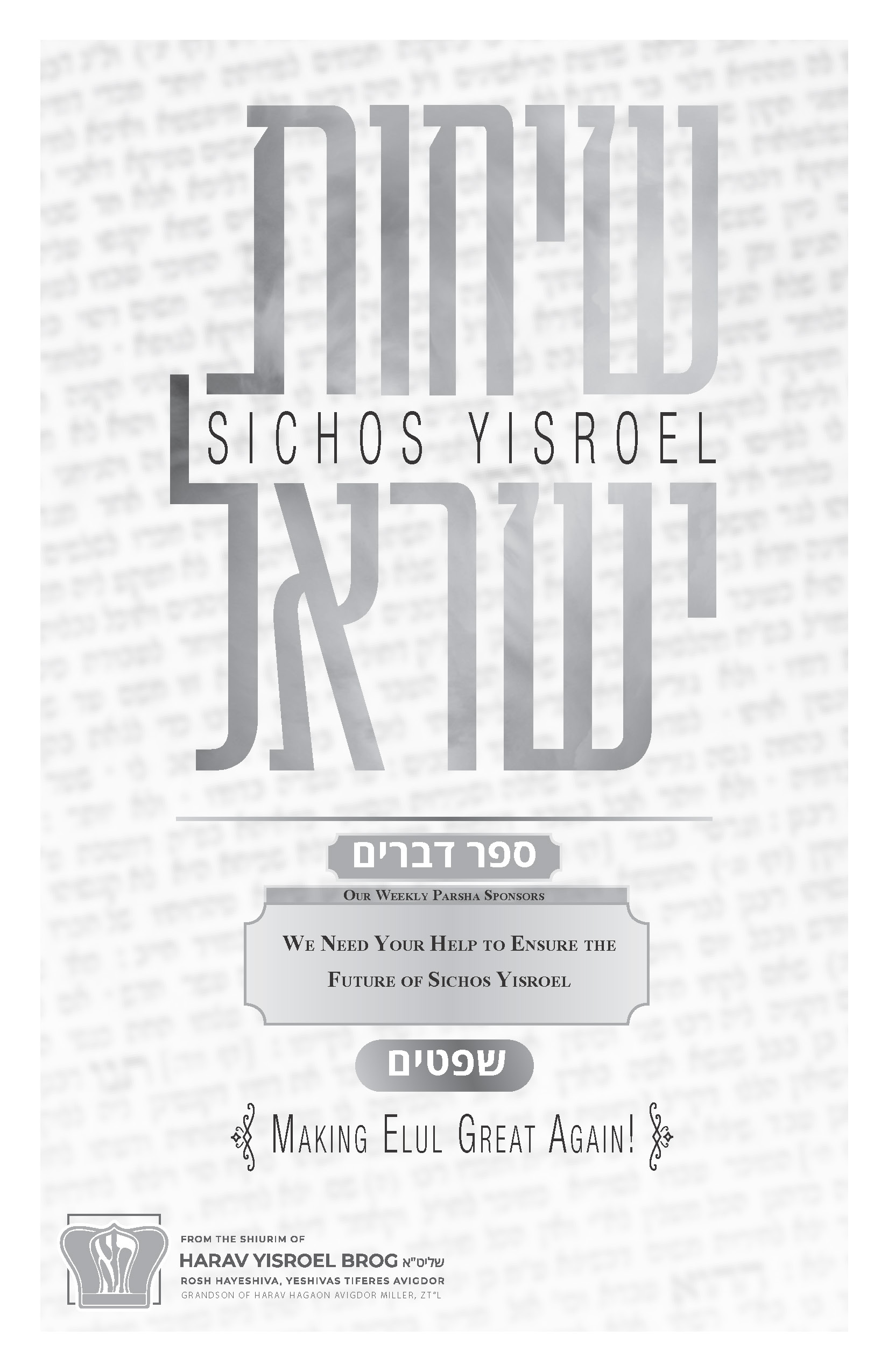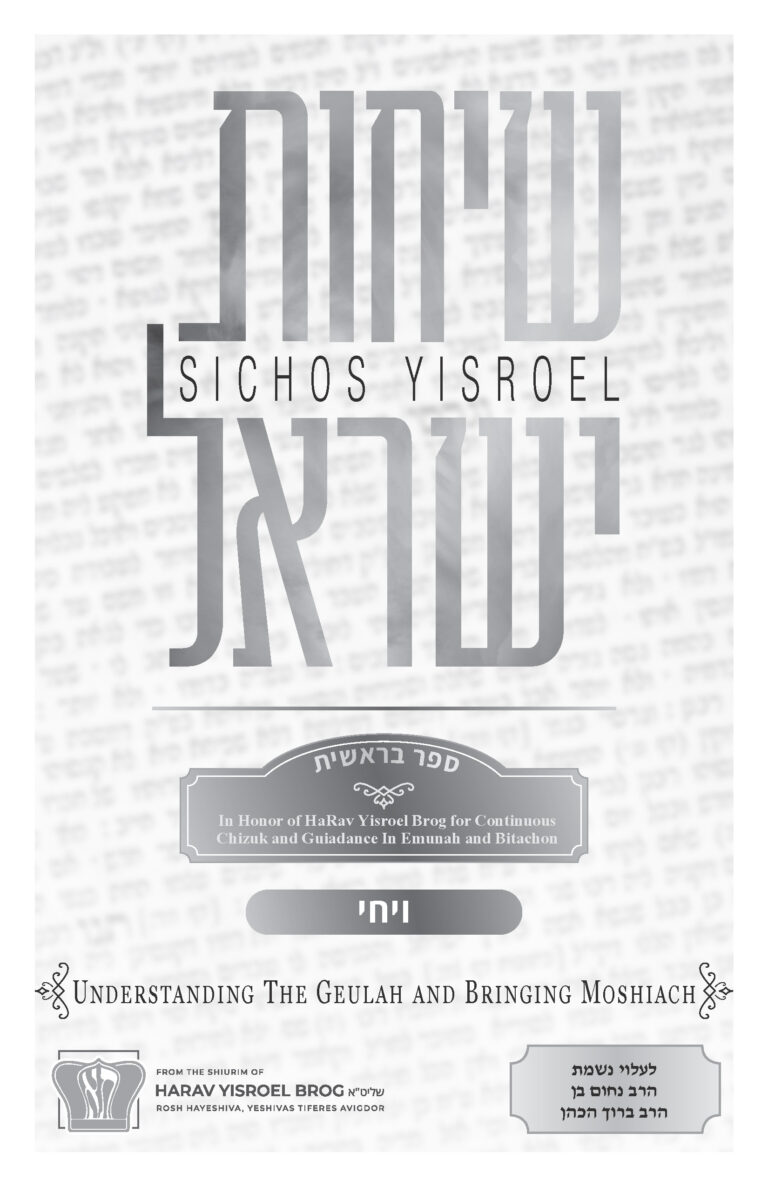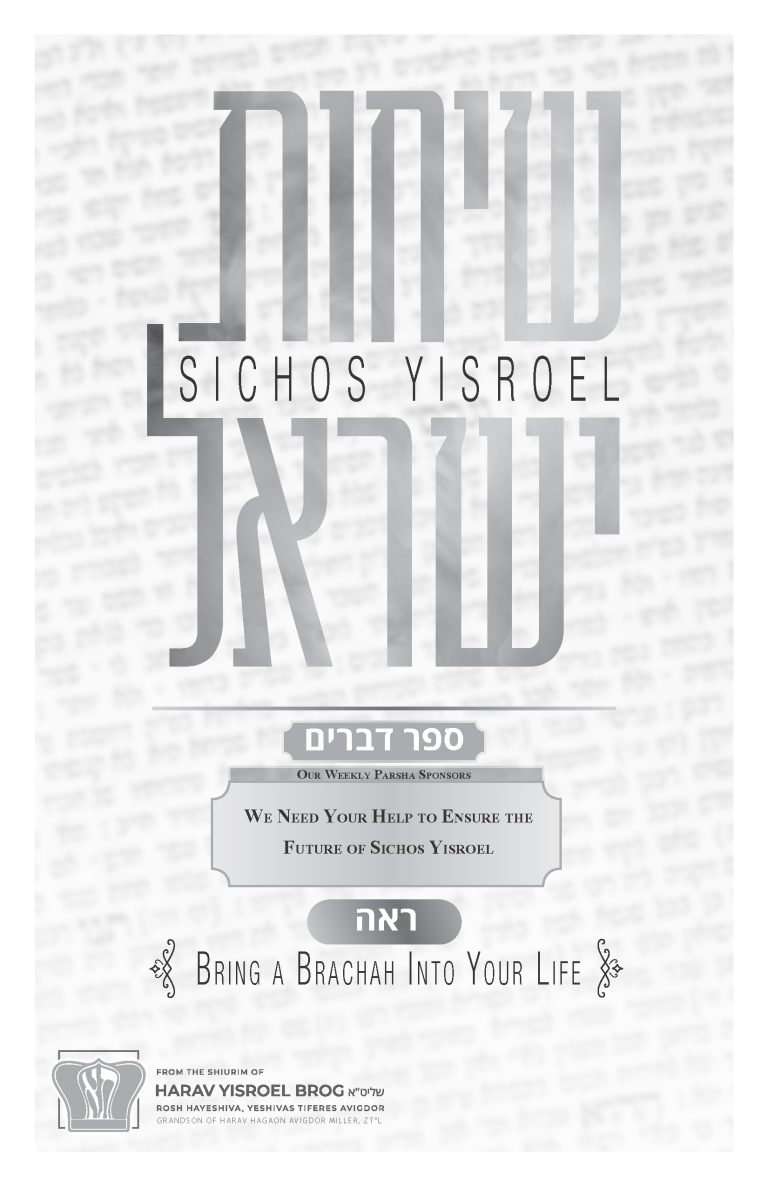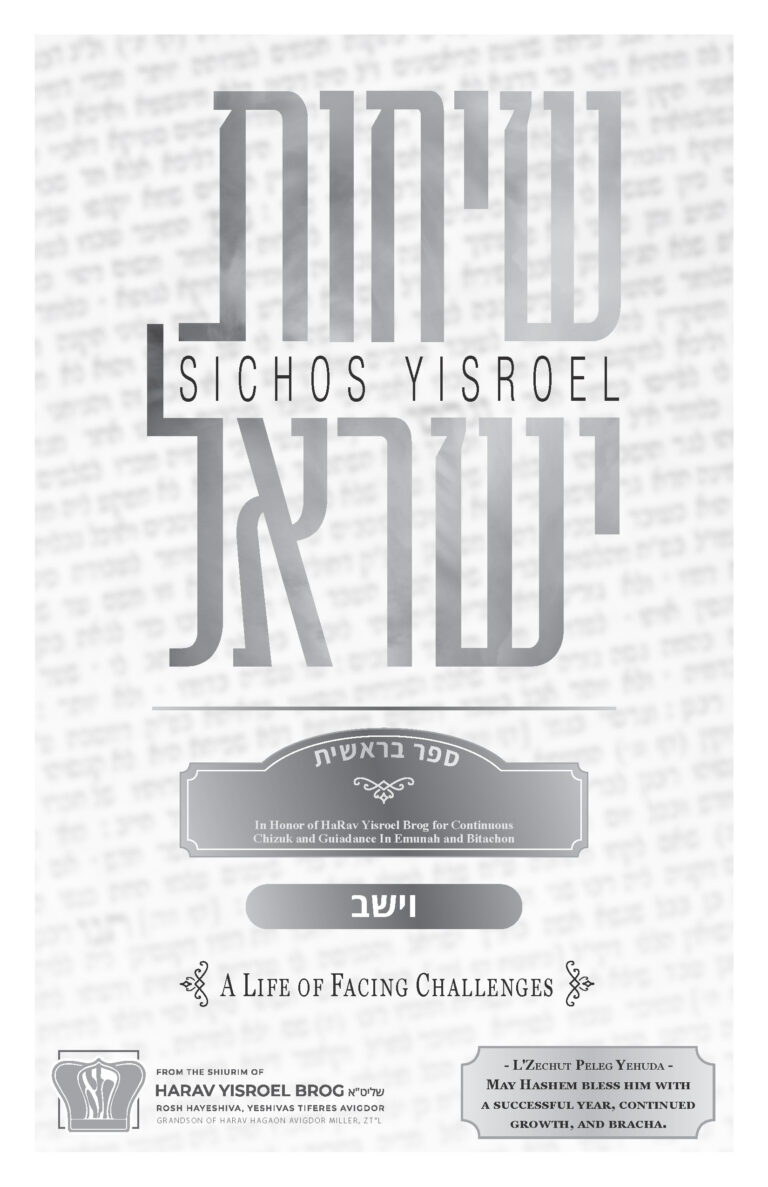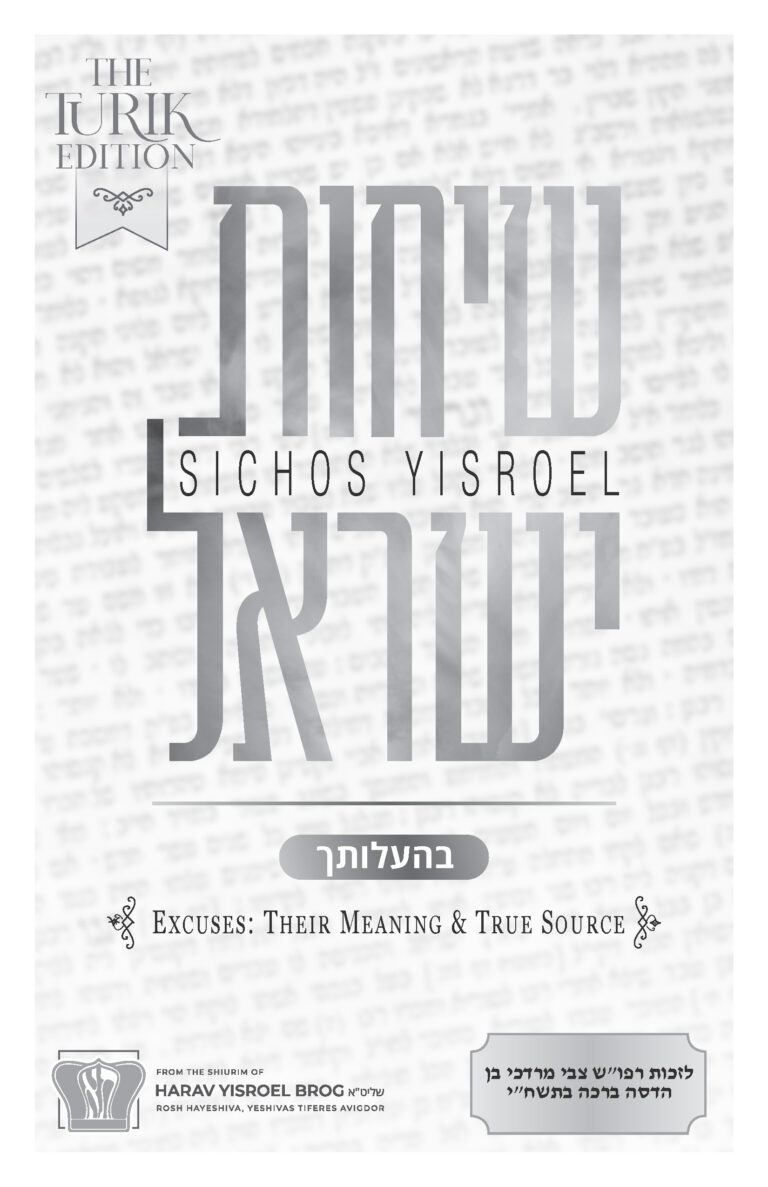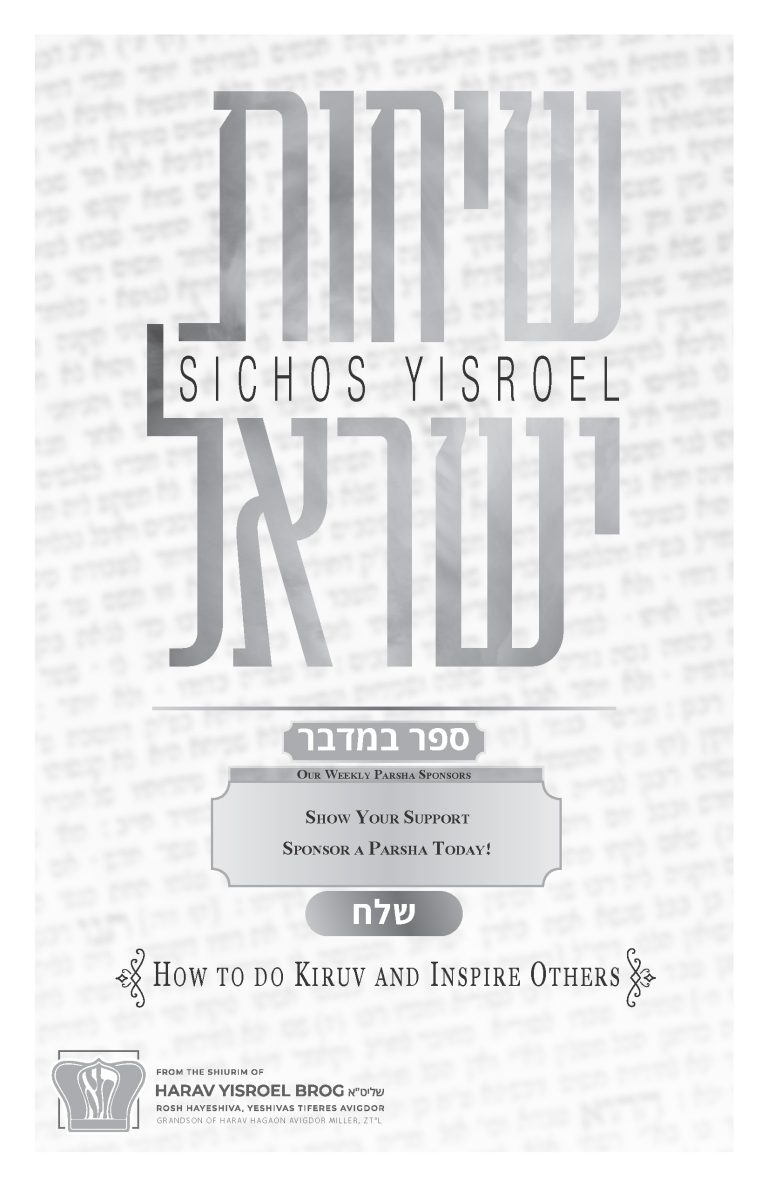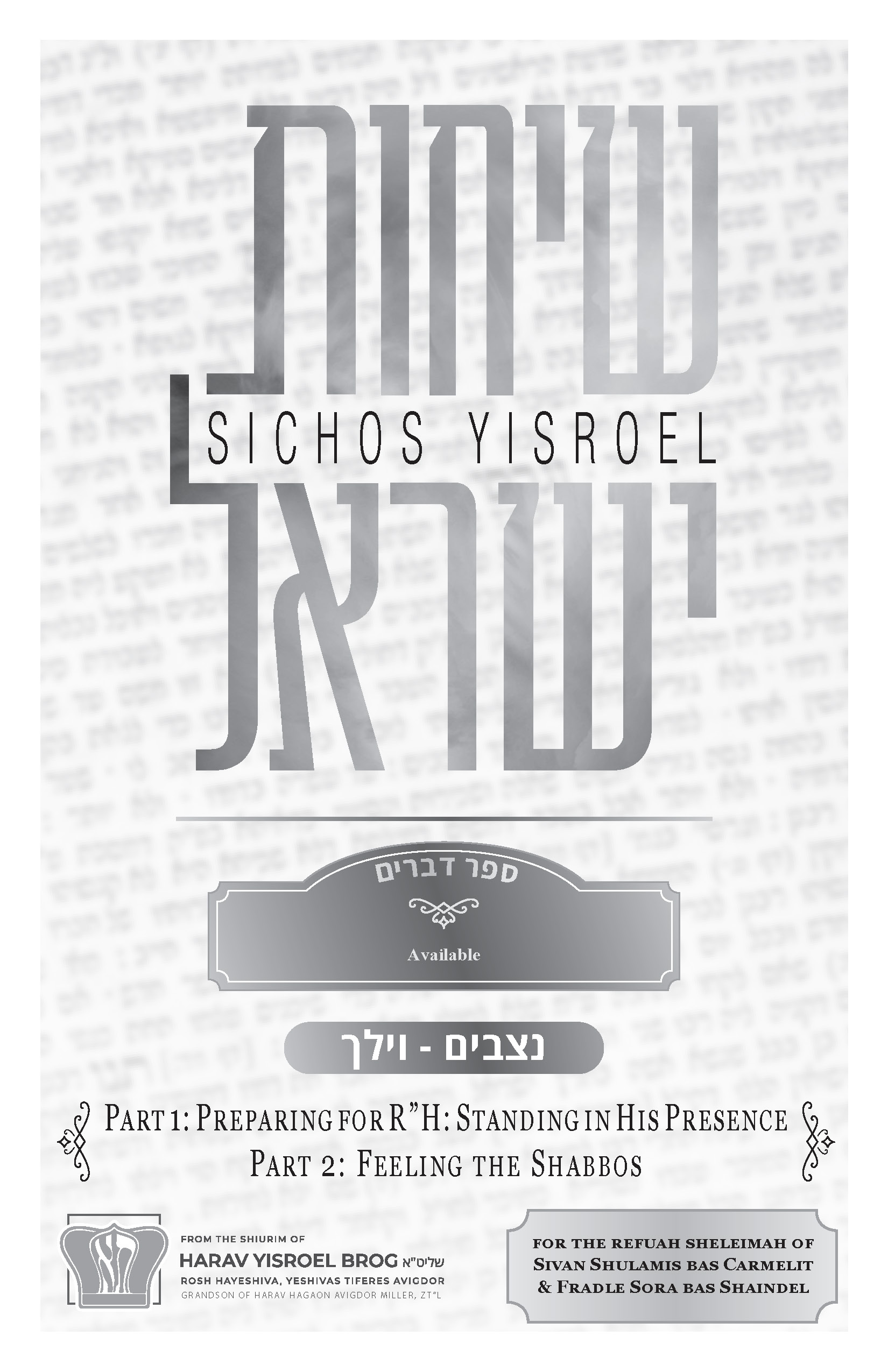Parshas Shoftim: Making Elul Great Again!
Sponsored
We Need Your Help to Ensure the
Future of Sichos Yisroel!
Consider sponsoring a shiur
Visit YTATorah.org
Shiur given in 5781
Getting the Most Out of Elul
Today is the first day of Rosh Chodesh Elul. A person has to be aware that when Elul comes, he has to get his mind ready. He has to prepare himself for Elul. If you just let Elul come and flow over you, you will not get any benefits from Elul. There are some things that you could experience while you’re sleeping and still derive benefits from them. For example, taking an x-ray or having an MRI done. They don’t require you to be consciously involved. It doesn’t make a difference. Even if you’re getting radiation treatment, it works even if you’re sleeping. It doesn’t say you have to participate.
Elul is Completely a Time of Mercy
So, we first have to understand what Elul is. The Vilna Gaon in Likutei HaGra at the end of Sefer Yetzirah makes a mind-boggling statement, a statement that I would expect from the olam hachassidus, not from the olam haGr”a. Yet, the Gr”a says the following statement: אלול כולו רחמים, Elul is completely a time of mercy, וימי רצון, and its days are when Hashem looks very favorably upon Klal Yisrael. והוא דרגה דחסד, it’s an outstanding madreigah, level, of unique chessed.
Now, Hashem always shows rachamim, but Hashem joins rachamim together with din. Except for the last month of the year, Elul, is כולו רחמים, and that is a tremendous insight.
The Vilna Gaon had a famous mechutan,known as the Chayei Adam (R’ Avraham Danzig, 1748-1821). The Chayei Adam (סימן קלח) writes, באהבת הקב”ה את עמו ישראל, that because of the love of Hakadosh Baruch Hu for His nation Klal Yisrael, הרבה להטיב אותנו, He increased, He went the extra mile, to be meitiv with us, וצונו לשוב לפניו בכל עת שנחטא, and He commanded us to do teshuvah whenever we sin. ואף שתשובה טובה בכל עת, and even though teshuvah is good at any time, still, in all, he says that Chodesh Elul הוא מובחר ומוכן יותר שמקובל תשובתו, is the time when teshuvah is much more readily accepted, much more so than during the rest of the year. Why? לפי שימים אלו ימי רצון מעת נבחרנו לעם, because these days are yemei ratzon – days of Divine favor – from when we became a nation.
All year long, there is a lot of rachamim, but the uniqueness of Elul is that it has rachamim that creates a mechilas avonos, a forgiveness for sins, which the rest of the year’s rachamim does not accomplish. Rachamim during the rest of the year accomplishes a lot of things. You can get parnasah. You can get brius. But not rachamim for mechilas avonos. The Arizal writes that the 13 middos harachamim are what governs these days of Elul. When Hakadosh Baruch Hu revealed the yud gimmel middos harachamim to Moshe Rabbeinu, that was the highest level of rachamim shayach. Before Hashem taught Moshe Rabbeinu about the yud gimmel middos harachamim, He told him: אני אעביר את כל טובי, I’m going to show you all of My tov, the ultimate tov before you. The Arizal says that the yud gimmel middos harachamim are at work day and night if a person is shayach to them, if a person relates to them.
Now, this is a tremendous revelation for us because it changes the whole perspective of Elul from being a scary time into being a time of tremendous ahavah and tremendous yedidus.
We Get to Have a Relationship with Hashem
One of the fundamental clarifications that everybody has to know is that Yiddishkeit is predicated upon us creating a relationship with Hashem. When we are very young, and we start off doing mitzvos, we have no shaychus to a relationship with Hashem. So you’re either a mitzvah boy or an aveirah boy or a mitzvah girl or an aveirah girl. You listen to the yetzer tov. You listen to the yetzer hara. But the concept of a relationship with Hashem is something that’s beyond most youths. People have to realize that the point of Yiddishkeit is to develop a very special, a very unique, and a very personal relationship with Hashem. No two children in a family have the same relationship with their mother or their father. Each one has their own relationship. Some better, some stronger, some weaker. So even when you have a relationship with somebody, that relationship is not static. They’re fluid situations. There are times when relationships get stronger or weaker.
Let’s say a person gets married and celebrates an anniversary. If he celebrates it properly with hakaras hatov, and has good middos, and appreciates the tovah that his spouse does and provides for him, then an anniversary will be what’s called an eis dodim. It will be a time of special closeness. Sometimes, people go away on a vacation together to celebrate their relationship, and it’s supposed to be a time of warmth, a time that regenerates, that strengthens the whole relationship physically and emotionally, and so on.
You have to know that it’s the same with Hakadosh Baruch Hu. There are times that are not all the same. There’s a time with Hakadosh Baruch Hu, where the relationship heats up. It warms up. It gets stronger. And the relationship builds, and that newly-strengthened relationship becomes a stepping stone to continue, and move forward.
Elul is that time. The time of Elul is a time of immense, intense kurvah, closeness.
Now you have to know how this kurvah works. How does it operate? Let’s say, in a relationship between a parent and a son, the parent knows when his son’s birthday is coming up. Or, maybe the son is graduating soon, or getting engaged, so they make a seudah in the house. Maybe the parents will go away with the child, take a trip to Eretz Yisrael to celebrate the upcoming simchah. Maybe they’ll spend a couple of days with their child. They’ll reminisce. But in these cases, it’s the parents who step forward and do for the child. It’s not the child doing for the parents.
Sometimes you have parents reaching a milestone in their lives, let’s say they’re married for 25 years, 50 years, and the children now decide they want to do something special for the parents. They come up with some ideas of how to be mechazek their parents, of how to relate to their parents. This is an eis dodim.
Time to Celebrate Yedidus with Hashem
Elul is not a time when Hakadosh Baruch Hu awakens you. Elul is אני לדודי ודודי לי. The way Elul works is: I have to feel and sense that Hashem is my beloved, and I come forward and embrace Hakadosh Baruch Hu. I celebrate that yedidus. I come to Hakadosh Baruch Hu and I say: “Hakadosh Baruch Hu, since You’re offering me this time of tremendous rachamim and tremendous chessed, I will come forward and I will do things to strengthen that yedidus, to be mekabel that yedidus, and be together with Hakodosh Boruch Hu.” In Elul, a person is supposed to be walking around, not taking his mind off that awareness. In Elul when you come to davening, it’s not like the rest of the year when you come to davening. Hashem wants us to communicate with Him. Hashem wants us to talk to Him. Hashem wants us to acknowledge that He is our sole source of all brachah and hatzlachah. Hashem wants us to come to Him. Coming to daven in Elul means to say: “Hashem, I’m coming. I’m speaking to my dodi, ani ledodi.” And Hashem responds: vedodi li.
When a person goes to learn Torah in Elul, it’s not approached as: “it’s something that I’m chayav to do; I’m metzuveh, and have to do it.” Rather, it should come from a feeling of yedidus. It has to come from the understanding that: “Hakadosh Baruch Hu, Torah is Your ratzon. Torah is what You delight in all day long. I’m going to delight in the Torah together with Hakadosh Baruch Hu.” That’s the right perspective. When a husband brings his wife a cup of coffee and something to eat on the morning of their anniversary and says, “with this, I begin a day of celebrating,” that’s step number one. It’s not the same coffee that he brought her the day before. It’s an andere cup of coffee. You have to know it’s the same with Hakadosh Baruch Hu and the kiyum of his hamitzvos.
Now, in Yiddishkeit there are certain peulos, certain actions, that are actions of yedidus. Bris milah is one of them. There are some people who were zocheh to get a name of yedidim. Avraham was considered a yedid Hashem. Shabbos is a time of yedidus. מה ידידות מנוחתיך. Lecha dodi. The whole concept of Shabbos is spending time beyedidus with Hakadosh Baruch Hu. Shabbos is also a tremendous time of rachamim. The Vilna Gaon says that tefillos are neskabel on Shabbos just like they’re neskabel during the Aseres Yemei Teshuvah. But during the yemei haElul, the humdrum life, the normal holech yeilech, has to manifest itself, has to express, has to show that I appreciate the opportunity of yedidus with Hashem.
We have the famous tefillah, Avinu Malkeinu. Elul is Avinu. We’re בנים אתם לה’ אלקיכם. Not avadim. Banim, sons and fathers – this aspect brings out a yedidus. Tishrei, the next month, will be a month where we proclaim Hashem as our Melech. But Hashem gives us a month to spend beyedidus.
We All Need Rachamim
Now, who amongst us does not need rachamim? Who amongst us does not have his pekel? Everybody has a pekel. If not today, you’ll have it tomorrow. If not tomorrow, maybe next year. Look how many people were facing awful misos meshunos last Yom Hakippurim. How many people perished rachmana litzlan in Meiron in such a strange, awful way?! How many people died in Surfside last week?! A group of bachurim died in a plane crash, and many other things happened over this year in terrible ways. When I was in Eretz Yisrael, I read an article that this summer had a higher number of drowning deaths compared to previous years. The article was telling everybody to be careful and take precautions. Elul is the eis rachamim. Had we perhaps been mechazek ourselves last Elul, we would have been zocheh to tremendous rachamim maybe. Maybe we would have been spared. The chiddush is not that the house collapsed. The chiddush is that houses don’t collapse all the time. The chiddush is not that planes crash. The chiddush is that planes don’t crash. The only One that controls every single thing is Hakadosh Baruch Hu.
How many people suffered from COVID this past year? How many people got the Delta? I just spoke to somebody recently who got the Delta variant of the COVID. They said they wanted to die. It was worse than anything you could imagine. The only reason they didn’t go to the hospital was they didn’t want to die for sure. That’s why they didn’t go to the hospital. They suffered tremendously. Day and night, they had constant suffering. Tremendous. They never had the vaccine. The spouse who had the vaccine also got the Delta variant, but it wasn’t mashpia terribly on the spouse.
Who knows what we’re facing? How many of us have children who need a shidduch? How many of us need children? How many of us need parnasah? There’s no end to the needs of Klal Yisrael. Elul is כולו רחמים. You have to tap into that rachamim. In Elul Hashem offers us a very unique opportunity. The way I picture Elul is that we’re in the ocean and we’re looking for some help, and suddenly a hand comes out from shamayim. The gemara says there’s a concept of hands coming out from shamayim and offering help. A hand comes out from shamayim and it says: You want to be with Me? Seize My hand. Why don’t you grab Me? You’ve got to seize My hand.
Ani ledodi, the word yedidus means yad yad. Yad equals fourteen begematria. Fourteen and fourteen begematria is twenty-eight. You know what that equals? Koach. The gematria of koach is twenty-eight. The koach that one gets from grasping the hand of Hashem. And this opportunity for rachamin exists day and night. I saw in a chassidishe sefer that big rebbes said Tehillim at night. Even though usually you don’t say Tehillim at night, they would say Tehillim at night in Elul because the Arizal says it’s sha’as rachamim day and night. You don’t realize that every single time you reach out to Hakadosh Baruch Hu, you are being mechazek that rachamim. You are bringing that rachamim to yourself. There’s no time like this!
Even the smallest action that a person does, for example, a person was to say at any time, “Hakadosh Baruch Hu, I love You, and I appreciate the tremendous opportunity of Elul!” You know what that is?! That’s tremendous! Imagine a person went to his relative and said, “You know, I’d like to offer you my hand and my help, whatever I can do for you.” It would make a person feel tremendous. Hakadosh Baruch Hu is waiting.
There was once a Yid, a tremendous tzaddik, a talmid chacham. His name was Rav Moshe Rosenstein (1881-1940). He was the menahel of Lomza Yeshivah in Europe. He was an adam gadol meod. He was zocheh to learn in Telz by Rav Lazer Gordon and also by Rav Shimon Shkop in Grodno. Later, he even learned in Kelm. He became a tremendous ba’al mussar. He was a special personality. One time Rav Moshe happened to be in the city of Bialystok where the Novardok Yeshivah was. The rosh yeshivah, Rav Avraham Yafin (1887-1970), the son-in-law of the Alter of Novardok, came to greet him. He asked him if he could please say some words of chizuk to the bachurim. It was the time of Elul. Sadly. they didn’t have tapes or other recording devices back then. What we do have is somebody who was present, Rav Yankel Galinsky (1920-2014).
Soldiers in the General’s Bunker Don’t Worry
He said Rav Moshe came to the bachurim and began to speak. He said, “There’s one perek in Tehillim that when reading it and studying its sentences, you could almost get the feeling that it was not said by Dovid Hamelech.” “An andere Dovid,” he said. A different Dovid wrote this. It’s not the usual nusach that Dovid Hamelech uses. They looked at him and wondered which perek he was referring to.
Rav Moshe said, “I’m talking about perek chaf zayin in Tehillim.” The one we say during Chodesh Elul לדוד ה’ אורי וישעי. He said to the bachurim, “Why could you get the impression that it is not from Dovid Hamelech?” He said, “It’s a different shprach. It’s a whole different nusach than the rest of the perakim in Tehillim. Throughout sefer Tehillim, we’re accustomed to read again and again the language of Dovid showing his yearning, his hope to be saved through yeshuas Hashem. He needs the yeshuah of Hashem and he’s reaching out for that salvation. Dovid Hamelech found himself in very challenging situations from his birth until his death. People were pursuing him, he had tzaros. And he’s pleading with Hashem throughout his life to save him. But in this mizmor, in this perek, you suddenly see a whole different tune. He gets a strength that we don’t know where it comes from. Suddenly, he’s not afraid of anybody. He’s not afraid of his enemies. He’s not afraid of people who want to harm him. ממי אירא, who shall I be afraid of? ממי אפחד, who shall I fear? בקרב עלי מרעים לאכול את בשרי צרי ואויבי לי, when my enemies surround me to devour me, what happens to them? המה כשלו ונפלו, they stumble and they fall. אם תחנה עלי מחנה, if a whole camp of enemies will gather against me, לא יירא לבי, I won’t be afraid, אם תקום עלי מלחמה בזאת אני בוטח. He found new strength in this perek. What’s different?” Rav Moshe asked, “Mah nishtaneh this mizmor, this perek, over all the other mizmorei Tehillim?” Where did Dovid Hamelech find this newfound confidence?
He said to the bochurim, “I’m going to tell you. Imagine there’s a soldier in battle and bullets are flying. All kinds of weaponry are going back and forward. The guy is in a trench. The guy is mamash petrified. He’s lost. Imagine the guy is suddenly invited into the protected bunker of the general of the army. No less. The second he gets into that bunker with the general of the army, you know what he feels? He’s safe. Because even though the enemies are searching out the general and even though they’re shooting the same as before, he knows when you’re next to the general, the guy in charge of the whole battle, the protection that he’s going to be granted and that he offers, is going to be a unique protection.”
Dovid Hamelech describes in this perek that he’s in a new place with Hakadosh Baruch Hu. He has a new relationship with Hashem. He’s together with Hashem bechvodo uveatzmo. And when a person is in the Beis Hashem, when he’s in the bunker and Hashem is with him there, when Hashem’s light and salvation are with him, then he has nothing to be afraid of. He now finds himself in the most protected of places. כי יצפנני בסכה ביום רעה יסתרני בסתר אהלו, I will hide in the sukkah on the day of evil. I will hide in a hidden place of His tents. I will be elevated. The second the tzarah comes, I’m going to be covered.
Rav Moshe told them, “You bnei yeshivos who are spending your lives toiling in Torah and avodas Hashem, you should know that you are always in the ‘bunker’ with Hashem. You don’t have what to be afraid of. You just have to remember that you’re in the ‘bunker’ with Hashem.”
Seek Rachamim From Yedidus
In Elul, every person should renew his awareness that he’s with Hashem. It’s worth it. Even if right now you don’t see anything that you’re eminently worried about, just look back on the previous year at all those people who had no hava mina that there was any danger lurking in their future. But it was lurking. It was there. And perhaps had they reached out to Hashem, they could have been zocheh לחסות בנועם ה’ ולבקר בהיכלו, and be spared the trials and tribulations. Thank Hashem. When you say מודים אנחנו לך, tell Hashem: “I’m thankful to You. I’m grateful to You that you’ve given me this opportunity to celebrate my yedidus with You.” Think of personal things you went through this past year, and you were spared. Think of the things, the challenges, the health challenges, the physical challenges, the emotional challenges, the family challenges, the parnasah challenges, all the challenges that you went through this year, and you were spared. That’s tremendous. And you tell Hashem, “I really appreciate that, and I want to spend some moments with You.”
It’s amazing! We have no idea what goes on by somebody else, but if we did, we’d be shocked to see how many challenges people really have. You tell Hashem, “I want to make amends. I’m sorry if I rejected Your advice, Your counsel, Your direction. I’m sorry if I rebelled against You, whether beshogeg or even bemeizid sometimes. I’m sorry, Hakadosh Baruch Hu.” If a person will do that, there’s no safek that he will earn himself a lot of rachamim from Hakadosh Baruch Hu.
Seek Rachamim Before the Gezeirah Comes
Now, it says if a person seeks rachamim before the gezeirah comes down upon a person, it’s much easier to get rachamim then and avoid the tzarah, than to get rachamim later on. I never dreamed last year that I was getting cancer. I knew it was shayach but I never dreamed it would happen, and it happened. And I’m overwhelmed with gratitude to Hakadosh Baruch Hu for having given me and shown me rachamim merubim, unlimited rachamim merubim.
When I was in Eretz Yisrael, I met a very special young man from America whose life is dedicated to helping cancer patients. The mesiras nefesh that this guy has for people is amazing. At four o’clock in the morning, he leaves his house to visit different hospitals. He makes his rounds from hospital to hospital, talking to doctors and being an advocate for patients and their families. He’ll bring them breakfast, bring them a coffee. The small things that he thinks of are just amazing, and he’s there for you before, during, and after.
I met him in Yerushalayim, and he didn’t know what to say. It finally got out that he was aware of my health situation, and he said to me, “I was waiting for you to call. You have my personal number.” I said, “I knew. I would have called you had I needed you.” He said, “What do you mean?! You didn’t need me?!” He said, “How did you deal with all the suffering?” I said, “I have to tell you that I didn’t suffer.” He said, “What do you mean?! In my experience, the cancer that you had has the most severe pain compared to any other cancer.” He told me, “I was davening so hard for you. I had your name. I was davening for you. I felt terrible for you.” I said, “Baruch Hashem.” That was rachamim.
But now you know what I’m thinking? If it came once, it could happen again. Now it’s much more real. I’m davening to Hashem now for rachamim. I appreciate now all the years that I didn’t have to deal with this. I still don’t have to deal with it any more. But who knows what the future will hold. You need rachamim from Hashem. You have to daven to Hashem and say to Hashem, “Take care of me so that I can stay healthy.” You cozy up to Hashem. You act beyedidus with Hashem. You do mitzvos out of a show of yedidus. There’s no safek that then Hashem will shower us with rachamim in this next month, and then we’ll be zocheh badin.
It’s much easier to regret something you did wrong when you’re beyedidus with somebody. I read a story recently about a lady who came to a beis hakevaros and punkt there was a minyan there. She said to the minyan, “I need you. Could you please come with me?” They said, “What did you do wrong? What’s the matter?” She said, “I have an emergency.” She took them to another kever just three rows away. She said, “I need mechilah from this person.” She said, “Our husbands were best friends. They got into an argument over business and she and I became the worst enemies. This lady was a very nice lady and I did the worst things that a human being could do. I forgot everything nice that she had done. I did terrible, terrible things to her. I lied about her. I attempted to destroy her life.” And she burst out crying terrible sobs. She said, “I understand if you don’t want to forgive me, but now I realize I was terrible. Please be mochel me.”
Serve Hashem Beyedidus
When a person acknowledges a friendship it’s much easier to do teshuvah and regret what he did wrong. When a person is beyedidus with Hakadosh Baruch Hu, and he’s thinking about all the tovos that Hashem did for him this year and all the brachah, the millions of chassadim that Hashem did for him, millions of tovos veniflaos, and a person tells Hashem, “I’m really sorry Hashem, that I treated You in this inappropriate fashion, and that I didn’t act to You in the way You were acting to me” – it’s easier to ask Hashem for rachmanus in that case.
Let us be mechazek ourselves, rabbosai. Let us tap into this goldmine of rachamim of Elul. Let us serve Hashem beyedidus. Think of things. Contemplate the things throughout the day. Im yirtzeh Hashem we’ll be zocheh badin.
The Bottom Line
A person must be prepared to take advantage of the yemei rachamimi of Elul; in contrast to the rest of the year, Elul is כולו רחמים. Elul is a time of ahavah from Hashem and yedidus. The Arizal says that the yud gimmel middos of rachamim can work for our benefit throughout Elul. Since Elul is the perfect time to strengthen our relationship with Hashem, Elul is also the time when our teshuvah is accepted more easily. Hashem is waiting for us to strengthen the relationship in this way during Elul. There is a ‘give and receive’ – Hashem offers us rachamim and chessed, and we respond by adding awareness and receiving Hashem’s yedidus. Elul is an opportunity to demonstrate a close relationship with Hashem in our daily lives, and when we reach out to Hashem and have a greater awareness of Hashem in Elul, it brings tremendous protection and rachmanus. Elul is a time when we can review the year that passed and think about the future. We can thank Hashem for the challenges from which we were spared this past year, seek rachamim for where we erred, and ask Hashem to spare us from future tzaros. This is accomplished much more easily when we are in a place of yedidus. This week (bli neder), when it is time to daven and learn Torah, I will have the mindset that my maasim come from a place of yedidus – to positively strengthen my relationship with Hashem, and besiyata diShamaya, I will merit drawing down chessed and rachamim and have a positive and effective journey of teshuvah.
